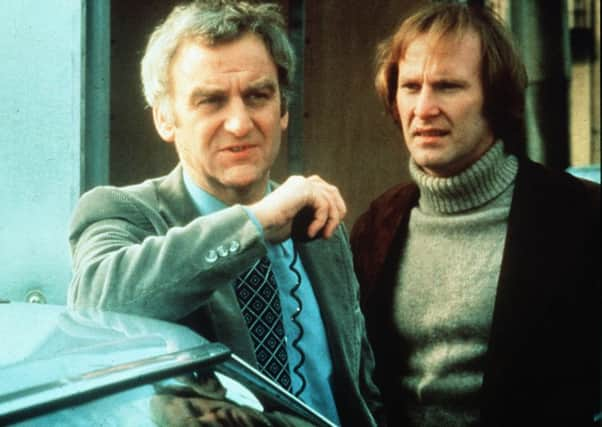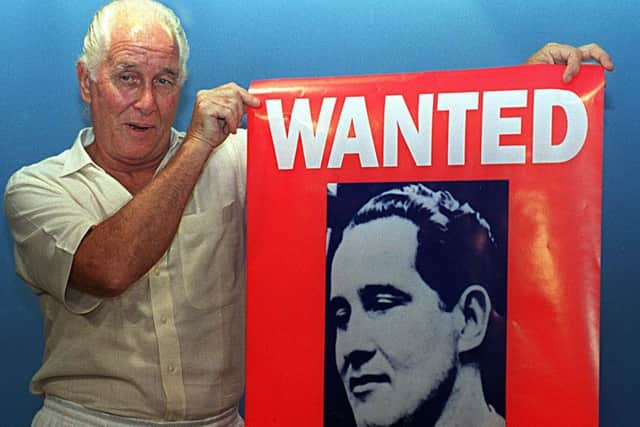The rise and fall of the bank robber explained – Susan Morrison


On March 7, some 59-year-old bloke, who is as yet unnamed, marched into the bank at Cameron Toll and demanded cash. Quite how he has reached the age of 59 without a name is a bit of a mystery. Could be a reason that he was a tad on the anti-social side.
This Butch Cassidy without the Sundance Kid was probably further miffed to be on the receiving end of a ticking off by a plucky bankteller who told him in no uncertain terms to naff off, there wasn’t any money.
Advertisement
Hide AdAdvertisement
Hide AdTime was when the bank robber was at the top of the criminal food chain. He (it was always a he) usually ran a firm of old lags, ready to do over banks back in the days when they boasted marble, stained glass and brass. Pens were firmly chained. There were desks with blank forms to be completed or scribbled on by bored children. Tellers had surnames, like Mr Pike or Miss Thursday, and no one ever put Happy to Help YOU on a name badge.


The robbers’ firm always included the getaway driver. A big fast Jaguar was the car of choice, especially if you could get your mitts on a model with a roaring 3.4 litre engine, with the sort of rock steady cornering that let you get your stockings off your head and split the loot neatly in the back seats. The Mark 2 boasted a fine big boot, should one of the lads threaten to blow the gang on the way to Spain, know what I mean? Handy piece of kit, the Jag. Say what you like about our criminal classes, at least they bought British. Or stole, at any rate.
Armed bank robbers were the top geezers in film and telly. Every episode of The Sweeney ended with John Thaw ramming some dude’s face into the bonnet of a Jag whilst snarling ‘you’re nicked, mate’.
In the background, Dennis Waterman would be belting across a derelict bombsite to rugby tackle a fleeing miscreant. Cue snappy closing dialogue. Roll credits and theme tune, which did not feature Mr Waterman singing the lyrics. I can only assume that was an oversight.
The British bank robber was a product of National Service. Lads from dubious backgrounds were pressed into the armed services, who promptly taught them how to use guns and explosives.
Upon the return to Civvy Street, our bold boys looked at the minor crimes of dad and grandad and got ambitious. It’s a very 60s sort of a story of upward mobility. The Great Train Robbery was planned with the military precision that Bruce Reynolds (British Army) and Buster Edwards (RAF) had picked up during their years of National Service. Ronnie Biggs was RAF, but dishonourably discharged after two years.
This could explain why the lads were top notch at stopping trains and precision timing, but rubbish at cleaning the hideout. They left so much debris littering the place they might as well have left a note saying, ‘It was us. Love Bruce and the boys’.
How we pay for supermarket stuff has changed out of all recognition
Advertisement
Hide AdAdvertisement
Hide AdOur recent (failed) bank robber has no such glamour about him. For one thing, he’s already banged up. Never mind the Criminal Costa, this lad didn’t even reach the Porty prom. He was wasting his time anyway. The cash you can stuff into sacks and lob in the boot is slowly vanishing.
Last week I was without my bank card for two whole days and forced to use actual money.
The bill at the supermarket was £18.19. I handed over a £20 note. The young cashiers face contracted with confusion. He took it from me, and the drawer opened. He looked at the display that told him how much change I was to get.
He stared at the cash trying to work out which coins made up £1.81. Eventually I leaned over and said, ‘One of those, one of those, one of those, one of those and one of those.’ I bet you’re working it out right now. Bless him.
Right, said Fred, give us your money
In the end it wasn’t East End lads or Great Train Robbers who robbed the banks dry. Nobody needed stockings over their heads, well, not to demand money from tellers at any rate.
The banks were looted by men who only hefted shotguns to shoot at grouse. Some even got titles. Fred Goodwin was never the sort of lad to pass over a note demanding all the cash in a holdall, but by the time his firm finished entire banks had disappeared, marble, brass, glass and all.
Not one of these geezers wound up in a cell.
To think they used to worry about us nicking the pens. Cheek.